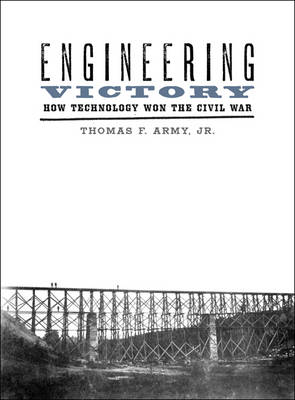
Stock image for illustration purposes only - book cover, edition or condition may vary.
Engineering Victory: How Technology Won the Civil War
Thomas F. Army
€ 59.78
FREE Delivery in Ireland
Description for Engineering Victory: How Technology Won the Civil War
Hardback. He reveals massive logistical operations as critical in determining the war's outcome. Series: Johns Hopkins Studies in the History of Technology. Num Pages: 384 pages, 18 black & white halftones, 10 maps. BIC Classification: HBJK; PDX. Category: (P) Professional & Vocational. Dimension: 229 x 152 x 29. .
Engineering Victory brings a fresh approach to the question of why the North prevailed in the Civil War. Historian Thomas F. Army, Jr., identifies strength in engineering-not superior military strategy or industrial advantage-as the critical determining factor in the war's outcome. Army finds that Union soldiers were able to apply scientific ingenuity and innovation to complex problems in a way that Confederate soldiers simply could not match. Skilled Free State engineers who were trained during the antebellum period benefited from basic educational reforms, the spread of informal educational practices, and a culture that encouraged learning and innovation. During the war, their rapid construction and repair of roads, railways, and bridges allowed Northern troops to pass quickly through the forbidding terrain of the South as retreating and maneuvering Confederates struggled to cut supply lines and stop the Yankees from pressing any advantage. By presenting detailed case studies from both theaters of the war, Army clearly demonstrates how the soldiers' education, training, and talents spelled the difference between success and failure, victory and defeat. He also reveals massive logistical operations as critical in determining the war's outcome.
Product Details
Publisher
Johns Hopkins University Press
Format
Hardback
Publication date
2016
Series
Johns Hopkins Studies in the History of Technology
Condition
New
Weight
650g
Number of Pages
392
Place of Publication
Baltimore, MD, United States
ISBN
9781421419374
SKU
V9781421419374
Shipping Time
Usually ships in 15 to 20 working days
Ref
99-50
About Thomas F. Army
Thomas F. Army, Jr., is an adjunct assistant professor of history at Quinebaug Valley Community College.
Reviews for Engineering Victory: How Technology Won the Civil War
Highly recommended.
Choice
A thoughtful treatise on an important subject related to war, culture, and society, Engineering Victory is highly recommended reading.
Civil War Books and Authors
Army's description of Union Army engineers and their accomplishments is certainly thorough and impressive. He relates numerous examples of how the effective use of engineers led to victory while an ineffective application led to defeat.
The Michigan Historical Review
Thomas Army Jr. has produced an interesting and thought-provoking study of military engineering in the Civil War with which students of the war, logistics, and technology will have to reckon.
Civil War Book Review
... Army has made a major contribution to the understanding of how engineering and technology played a vital role in Union victory. Every scholar interested in the Civil War, the Union war effort, and the history of technology should grapple with his arguments and their implications.
The Journal of Southern History
... Engineering Victory deserves praise...
Journal of the Shenandoah Valley During the Civil War Era
Engineering Victory will appeal to historians in the areas of technology, education, and military studies. Obviously, historians of science and technology will benefit the most from this book since it is primarily written for the purposes of highlighting engineering advancements and implementations by the Union Army during the Civil War... While Army does not deny that the Union had material and industrial advantages over the Confederacy, by examining the state of education in the North and the role Union engineers played in winning the war, he has opened a new avenue to explore in why the Civil War ended with a Union victory. Military historians would be wise to follow the trail that Army has started and continue this exploration of avenue of Civil War history.
Joshua Camper, University of Tennessee Martin
H-War Book Reviews
Choice
A thoughtful treatise on an important subject related to war, culture, and society, Engineering Victory is highly recommended reading.
Civil War Books and Authors
Army's description of Union Army engineers and their accomplishments is certainly thorough and impressive. He relates numerous examples of how the effective use of engineers led to victory while an ineffective application led to defeat.
The Michigan Historical Review
Thomas Army Jr. has produced an interesting and thought-provoking study of military engineering in the Civil War with which students of the war, logistics, and technology will have to reckon.
Civil War Book Review
... Army has made a major contribution to the understanding of how engineering and technology played a vital role in Union victory. Every scholar interested in the Civil War, the Union war effort, and the history of technology should grapple with his arguments and their implications.
The Journal of Southern History
... Engineering Victory deserves praise...
Journal of the Shenandoah Valley During the Civil War Era
Engineering Victory will appeal to historians in the areas of technology, education, and military studies. Obviously, historians of science and technology will benefit the most from this book since it is primarily written for the purposes of highlighting engineering advancements and implementations by the Union Army during the Civil War... While Army does not deny that the Union had material and industrial advantages over the Confederacy, by examining the state of education in the North and the role Union engineers played in winning the war, he has opened a new avenue to explore in why the Civil War ended with a Union victory. Military historians would be wise to follow the trail that Army has started and continue this exploration of avenue of Civil War history.
Joshua Camper, University of Tennessee Martin
H-War Book Reviews
